
Ending Disenfranchisement
Annette Scott ’01, ’06M is helping parolees and those on probation in New Jersey vote this election season. It’s a right that’s been lost to them for more than a century.
One hundred years after the League of Women Voters was formed by leaders of the women’s suffrage movement, many local league members are focusing their attention on supporting a new group, helping those on parole or probation in New Jersey register to vote. One of the members helping to lead this effort is Annette Scott ’01, ’06M.
“In New Jersey, since 1844—it’s been 176 years— that if you were incarcerated and on parole or probation, you could not vote. I had never known that,” says Scott, who joined the League of Women Voters of Southern Monmouth County (LWVSMC) in 2018. “And people believe if they have fines or committed a felony they can’t vote, and that’s not true. … It’s not according to the felony; it’s according to your status.”
In March 2018, Scott formed a partnership between the LWVSMC and the Monmouth County chapter of the New Jersey Reentry Corporation to launch the Reenter-Register-Vote (RRV) initiative, which makes the voter registration process a regular part of a citizen’s reentry into society once their sentence is complete.
She started out teaching classes once a week at NJ Reentry’s office in Neptune City, educating returning citizens, like those who had completed their felony sentence, about their right to vote and assisting them in their registration by reviewing and mailing each application.
“People are released every week from correctional facilities, and they come to the reentry program to get … help with [finding] employment, social services, legal services—whatever they need to keep them from going back to what they knew,” Scott says. “So that’s great, but as far as restoring their voting rights, that wasn’t part of it … and it’s probably not your first priority when you come out, but it is very important.”
While Scott was growing the RRV initiative, the New Jersey Institute for Social Justice and its partners launched the “1844 No More” campaign, which sought to restore voting rights for New Jerseyans on parole and probation, who were unable to vote before completion of their sentence. That work culminated in Gov. Phil Murphy signing a law in December 2019 that restored voting rights for 83,000 people on parole or probation.
The law took effect last March, and since then, Scott and her colleagues have worked to grow the RRV initiative. They’re currently partnered with all eight NJ Reentry chapter offices including the Paterson and Newark chapters, which see the largest influx of returning citizens, and are working to create and grow partnerships with various groups across the state such as GEO Parole Services, an organization that specifically supports those on parole and probation on behalf of the New Jersey State Parole Board.
In addition to teaching classes, Scott trains other league volunteers, partner organization staff, and university interns across the state, keeping everyone up to date on election laws and schedules. She even visited Monmouth last year to talk with students in Adjunct Professor Leonard Ward’s criminal justice class.
To date, Scott and her colleagues have helped to register over 1,000 people via Reentry programs and community events and over 125 people on parole and probation via partnerships with GEO Parole Services and other groups, allowing them to legally cast a ballot before completion of their custodial sentence. For their efforts, Scott and the LWVSMC were recognized with the League of Women Voter’s national “Building Strategic Partnership” award.
Moving forward, Scott says there are plans for more partnerships, and the RRV initiative will also be expanded to local libraries that are part of Fresh Start @ Your Library, a statewide reentry program focused on supporting individuals returning to their home communities. Scott has already connected with fellow Hawk David Perez ’17M, who is the social work and diversity services manager at the Long Branch Public Library, which offers the Fresh Start program to local citizens.
Despite all of the accolades and progress, Scott recognizes there’s still a lot of work to be done. The RRV was slowed by COVID-19 and the fact that many returning citizens have difficulty tracking down paperwork in order to reinstate their driver’s licenses so they can register to vote. Luckily, beginning in September, the state has allowed people to register with their social security number, fast-tracking the voter registration process for all citizens.
It’s been a busy year for Scott, especially leading up to the presidential election, but she says the reactions she and her colleagues receive from returning citizens makes it all worth it.
“Some people that have been released have been serving for 30 years, and if you were 18 years old when you went in, you’re now almost 50 years old when you get out, so you’ve never voted,” Scott says. “So every single one of them, when I ask if they want to register to vote, they say, ‘Yes, thank you so much. You don’t know how much I’ve wanted to do this, and I’m so glad you’re here to help me.’”